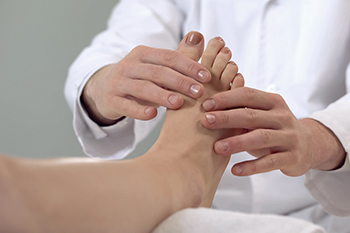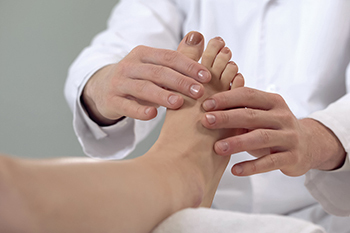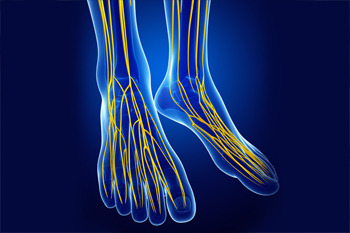Blog
Exercises That May Help Children With Flat Feet

When the arch of the foot is not fully developed, it is known as flat feet. The medical term for this ailment is called pes planus and it affects most babies when they are born. The arch will fully develop in most people in their teenage years and there are specific exercises and stretches that can be performed which may help with existing discomfort. Have your child stand on one foot as this is an effective method of using the small muscles inside of the foot and around the ankles as balance is maintained. A good exercise that can strengthen the toes is done when your child picks up marbles that are on the floor with their feet as this can help build up the arch. Ask your child to walk on a curb. This is an effective way for them to learn how to balance on narrow surfaces and will strengthen the ankle and arch and may help to gradually develop the foot. If you would like additional information about how to live with flat feet and possible ways to strengthen the arch, please confer with a podiatrist.
Flatfoot is a condition many people suffer from. If you have flat feet, contact one of our podiatrists from Pennsylvania. Our doctors will treat your foot and ankle needs.
What Are Flat Feet?
Flatfoot is a condition in which the arch of the foot is depressed and the sole of the foot is almost completely in contact with the ground. About 20-30% of the population generally has flat feet because their arches never formed during growth.
Conditions & Problems:
Having flat feet makes it difficult to run or walk because of the stress placed on the ankles.
Alignment – The general alignment of your legs can be disrupted, because the ankles move inward which can cause major discomfort.
Knees – If you have complications with your knees, flat feet can be a contributor to arthritis in that area.
Symptoms
- Pain around the heel or arch area
- Trouble standing on the tip toe
- Swelling around the inside of the ankle
- Flat look to one or both feet
- Having your shoes feel uneven when worn
Treatment
If you are experiencing pain and stress on the foot you may weaken the posterior tibial tendon, which runs around the inside of the ankle.
If you have any questions please feel free to contact one of our offices located in Plymouth Meeting and Ambler, PA . We offer the newest diagnostic and treatment technologies for all your foot and ankle needs.
Selecting Shoes For Your Child

As your toddler grows and matures, their feet are also growing and developing at the same time. Since your child’s feet are an important part of their body, selecting the right kind of shoe is imperative to maintaining overall foot health. This is true especially because the bones in a young child’s feet are still soft and ill-fitting shoes can exacerbate any existing foot deformities in a toddler. There are several things to keep in mind when shopping for your child’s shoes. First, you can be mindful of selecting shoes that have velcro straps. This can help ensure that both you and your child can keep the shoes fastened onto the feet. Second, you can look for shoes that have a spacious toe box, which will not crowd the child’s toes. Lastly, in terms of material, it can be important to select shoes that are made of breathable material, such as leather or mesh. This mesh is comparable to that used in running shoes. You may notice that a child will tend to grow out of their shoes at a seemingly rapid pace. However, it is nonetheless important to find shoes that are of high quality for your child. If you are concerned about your child’s shoes, please consult with a podiatrist who can help you.
Making sure that your children maintain good foot health is very important as they grow. If you have any questions, contact one of our podiatrists of Pennsylvania. Our doctors can provide the care you need to keep you pain-free and on your feet.
Keeping Children's Feet Healthy
Having healthy feet during childhood can help prevent medical problems later in life, namely in the back and legs. As children grow, their feet require different types of care. Here are some things to consider...
Although babies do not walk yet, it is still very important to take care of their feet.
Avoid putting tight shoes or socks on his or her feet.
Allow the baby to stretch and kick his or her feet to feel comfortable.
As a toddler, kids are now on the move and begin to develop differently. At this age, toddlers are getting a feel for walking, so don’t be alarmed if your toddler is unsteady or ‘walks funny’.
As your child gets older, it is important to teach them how to take care of their feet.
Show them proper hygiene to prevent infections such as fungus.
Be watchful for any pain or injury.
Have all injuries checked by a doctor as soon as possible.
Comfortable, protective shoes should always be worn, especially at play.
If you have any questions please feel free to contact one of our offices located in Plymouth Meeting and Ambler, PA . We offer the newest diagnostic and treatment technologies for all your foot and ankle needs.
Pinched Nerves Can Cause a Variety of Uncomfortable Symptoms

A pinched, or compressed, nerve can occur anywhere in your foot, such as in the heel, ball, or even on the bottom. A pinched nerve can produce pain or sensations of tingling, numbness, weakness, or the feeling that your foot has fallen asleep. The pain may radiate out to the toes or arches and become noticeable after exercising, walking, or standing for a while. What causes a nerve in your foot to become pinched? Injuries, medical conditions, tight ligaments, inflamed tendons, wearing tight shoes, obesity, or nerve entrapment conditions such as Morton’s neuroma. Switching footwear, resting, icing, immobilizing the area, or massaging it can sometimes provide temporary relief. However, if the symptoms persist or worsen, a podiatrist should examine your foot and run tests to determine the cause of your condition. Taking prompt, appropriate action will help reduce the risk of permanent nerve damage.
Foot Pain
Foot pain can be extremely painful and debilitating. If you have a foot pain, consult with one of our podiatrists from Pennsylvania. Our doctors will assess your condition and provide you with quality foot and ankle treatment.
Causes
Foot pain is a very broad condition that could be caused by one or more ailments. The most common include:
- Bunions
- Hammertoes
- Plantar Fasciitis
- Bone Spurs
- Corns
- Tarsal Tunnel Syndrome
- Ingrown Toenails
- Arthritis (such as Gout, Rheumatoid, and Osteoarthritis)
- Flat Feet
- Injury (from stress fractures, broken toe, foot, ankle, Achilles tendon ruptures, and sprains)
- And more
Diagnosis
To figure out the cause of foot pain, podiatrists utilize several different methods. This can range from simple visual inspections and sensation tests to X-rays and MRI scans. Prior medical history, family medical history, and any recent physical traumatic events will all be taken into consideration for a proper diagnosis.
Treatment
Treatment depends upon the cause of the foot pain. Whether it is resting, staying off the foot, or having surgery; podiatrists have a number of treatment options available for foot pain.
If you have any questions, please feel free to contact one of our offices located in Plymouth Meeting and Ambler, PA . We offer the newest diagnostic and treatment technologies for all your foot care needs.

